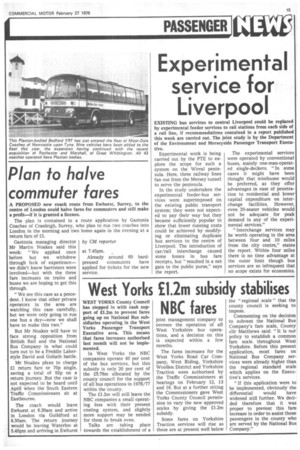Experimental service for Liverpool
Page 17

If you've noticed an error in this article please click here to report it so we can fix it.
EXISTING bus services to central Liverpool could be replaced by experimental feeder services to rail stations from each side of a rail line, if recommendations contained in a report published this week are carried out. The joint study is by the Department of the Environment and Merseyside Passenger Transport Executive.
Experimental work is being carried out by the PTE to explore the scope for such a system on the Wirral peninsula. Here, three railway lines fan out from the Mersey tunnel to serve the peninsula.
In the study undertaken the experimental feeder-bus services were superimposed on the existing public transport system; they were not expected to pay their way but they became sufficiently popular to show that lower running costs could be achieved by modifying or eliminating duplicate bus services to the centre of Liverpool. The introduction of car/rail interchange caused some losses in bus fare receipts, but " resulted in a net gain to the public purse," says the report. The experimental services were operated by conventional buses, mainly one-man-operated single-deckers. "In some cases it might have been thought that minibuses would be preferred, as they offer advantages in ease of penetration to residential and lower' capital expenditure on interchange facilities. However, even 20-seater vehicles would not be adequate for peak demand in any of the experimental services."
"Interchange services may be worth operating in the area between four and 10 miles from the city centre," states the report. Within four miles there is no time advantage at the outer limit though bus services are so infrequent that no scope exists for economies.




















































































